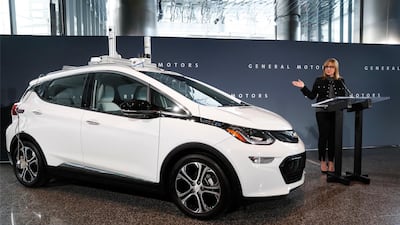US President Donald Trump’s top economic adviser on Monday said the White House wants to end subsidies for electric-vehicle purchases, without saying how it would eliminate the incentives that were created by Congress.
Larry Kudlow, director of the White House National Economic Council, told reporters that electric-car subsidies "will all end in the near future", suggesting 2020 or 2021 when asked for a timeline.
He also said no plans are in place to cut off General Motors from federal spending after Mr Trump last week directed agencies to explore how to do so after lashing out on Twitter at the automaker's plans to close plants and cut thousands of jobs.
_______________
Read more:
Middle East among the pioneers of electric car adoption
_______________
Mr Kudlow didn’t provide details on what the White House would do to eliminate or change the electric-car tax credits, which would require an act of Congress. Experts doubt the sweetener can be changed by executive order.
Currently, consumers who buy plug-in electric cars are eligible for a US$7,500 (Dh27,547.50) federal tax credit, which begins to phase out after for each manufacturer after selling 200,000 eligible vehicles.
“We want to end, we will end, those subsidies and others of the Obama administration,” Mr Kudlow said.
Mr Trump last week directed several angry tweets at GM, the largest US carmaker, after the company announced plans to cut as many as 15,000 jobs and cancel production at five plants in North America, saying in one last Tuesday that "we are now looking at cutting all @GM subsidies".
If the current incentive were left unchanged, GM buyers in 2020 could be left with no credit at the current pace of sales. That’s because the $7,500 credit phases out in a one-year period starting the second calendar quarter after a manufacturer hits the 200,000-vehicle threshold – a milestone GM is expected to reach in coming months.
Lawmakers have sought to extend the credit by raising the 200,000-vehicle cap, but legislation unveiled by House Republicans on Monday didn’t include an extension of the electric-vehicle tax credit sought by a coalition that includes GM and Tesla.
The Senate has yet to make its version of the legislation, though Senator Orrin Hatch, the Utah Republican who chairs the Finance Committee, said earlier this month it’s possible an extension will be included in the bill.

